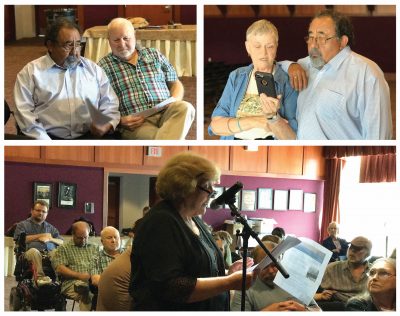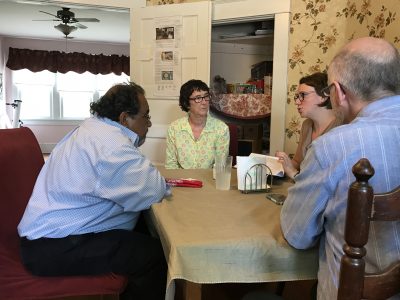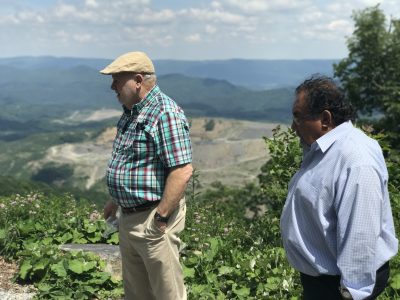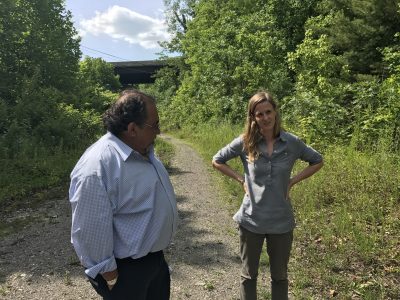Front Porch Blog

Top left: Stanley Sturgill, of Kentuckians for the Commonwealth and Rep. Grijalva. Top right: Mary Love, of Kentuckians for the Commonwealth and Rep. Grijalva. Bottom: Sister Jaculyn Hanrahan speaks during the public meeting. Photos: House Natural Resources Committee Democrats
On Saturday, June 10, people from coal-impacted communities across Central Appalachia gathered in Wise County, Va., to share their concerns and ideas with U.S. Representative Raúl Grijalva, the ranking Democrat on the House Natural Resources Committee.
About 33 people attended a public meeting with the congressman. They shared their experiences with mountaintop removal coal mining near their homes, changes to their employment and benefits as the coal industry has shifted from underground to surface mining, and their ideas for creating a prosperous future for Central Appalachia as the region moves forward.
“In my opinion the act of blowing up a mountain above the homes of hardworking American people is, in fact, domestic terrorism. I am tired of my people being the collateral damage of an industry that does not give a damn about the destruction and illness left behind when they leave,” Wendy Johnston of West Virginia told Rep. Grijalva.
Residents also described economic development opportunities priorities including expanding broadband access, improving productivity for farming and agroforestry on formerly mined land, the need to maintain funding for the Appalachian Regional Commission, and the importance of community involvement and economic development in Abandoned Mine Land reclamation.
After the public meeting, the congressman had lunch with a small group of community members to have a more in-depth conversation about mining impacts and potential benefits of the RECLAIM Act, a bill that would direct $1 billion to clean up abandoned mine sites and repurpose them for an economically beneficial use.

Rep. Grijalva at lunch with Diana Withen, of Southern Appalachian Mountain Stewards, Gabby Gillespie and Brad Shepherd.
“We were so grateful to get to sit down with Ranking Member Grijalva and talk about the need for urgency in moving RECLAIM forward,” said Gabby Gillespie, a Southwest Virginia Sierra Club organizer and member of Southern Appalachian Mountain Stewards. “People have been working hard to pass resolutions and come up with economic projects and solutions, and now we need more investment.”
During the lunch, community members focused on the importance of community involvement and raised concerns about proposed changes to the bill.
“We need RECLAIM to stay true to the original purpose of the bill, which was to bring economic development projects to our region with our resident’s input so that our communities are the ones shaping our future,” Gillespie said.
Rep. Grijalva then went on a tour of several mine-impacted sites around Wise County. The tour included the Looney Ridge Mine, a mountaintop removal mine owned by A&G Coal Corporation. A&G Coal is a subsidiary of Southern Coal, which is owned by West Virginia Governor Jim Justice. The Looney Ridge complex has been active for well over a decade but has been in temporary cessation since 2013.
Companies may apply for temporary cessation when market conditions are not favorable. Under this circumstance, the company neither removes coal nor pursues reclamation, assuming they will resume mining when market conditions improve. Most recently, the A&G Coal applied for a permit revision that would exempt it from regrading the land, as originally required. The company stated that because it had not been removing coal, it did not have the overburden necessary to return the land to its approximate original contour. The Virginia Department of Mines, Minerals and Energy denied the request.
The congressman also visited the Tipple Hill site in Norton, Va. This Abandoned Mine Land site is the proposed location for a park and riverwalk. It is one of several sites featured in Appalachian Voices’ Healing Our Land, Growing Our Future report. The RECLAIM Act could help to accelerate much-needed funding for remediation of acid mine drainage on the site, which is an important next step toward the realization of the park.
Rep. Grijalva is familiar with mining impacts in his home state of Arizona and has supported efforts to protect Appalachian communities from the impacts of mountaintop removal. Taking the time to visit the region and hear from impacted residents about their experiences likely deepened the congressman’s understanding of the unique issues in Central Appalachia.
Opportunities like this are critical for ensuring that citizens can play a direct role in decision-making that impacts their daily lives. Appalachian Voices looks forward to working with each of our elected representatives to secure a strong and just economic future for Central Appalachia.
PREVIOUS
NEXT
Related News

Leave a comment
Your email address will not be published. Required fields are marked *


